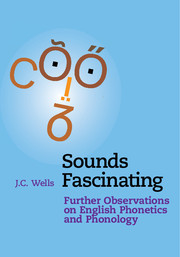21 - Postscript
from PART IV - ROUNDUP
Published online by Cambridge University Press: 05 September 2016
Summary
Skills Now Useless
Time marches on, and some of the skills I learnt as a small child are now useless. I am thinking in particular of those relating to the pounds-shillings-and-pence currency we had in Britain before decimalization in 1971.
Adding, subtracting, multiplying, and dividing sums of money was quite complicated in those days. And there were no calculators to help us.
There were twelve pence in a shilling, twenty shillings to a pound. Fivepence was written 5d and pronounced ˈfaɪfpəns (note the irregular voicing assimilation and the weakening of -pence). Multiplying it by two was straightforward: 10d ˈtenpəns (or usually ˈtempəns). Multiplying it by three, however, gave you one shilling and threepence, written 1s 3d or more usually 1/3 ˈwʌn ən ˈθriː. Threepence on its own, however, was pronounced ˈθrepəns or ˈθrʌpəns.
The coins I would have in my pocket as a boy would probably include a halfpenny ˈheɪpni (½d), a penny, a threepenny bit ˈθrepni ˈbɪt (3d), a sixpenny ˈsɪkspəni piece or sixpence ˈsɪkspəns (6d), also known as a tanner, a shilling piece (1/-), a florin ˈflɒrɪn worth 2/-, sometimes called a two bob bit, and a half-crown ˈhɑːf ˈkraʊn, worth 2s 6d, 2/6 ˈhɑːf ə ˈkraʊn or ˈtuː ən ˈsɪks,. By the time I moved on from primary school, the farthing ˈfɑːðɪŋ (¼d) had disappeared from general use, though before I even started school I can remember my mother sending me to the shop for a small loaf that cost fourpence three-farthings (4¾d).
Two half-crowns made five bob (5/-), and eight half-crowns made a pound. Elevenpence times three made 2s 9d. ‘Come on, boy’, my prep school maths master might say, ‘how much is £1 divided by three? And by eight?’ (Answers: 6s 8d and 2s 6d.). What's 3d divided by two? (1½d, that is a penny halfpenny ˈheɪpni or three halfpence ˈheɪpəns.)
My grandfather would send a gift of a ten-shilling note (or a postal order for ten shillings), with an instruction that I should divide it with my brothers proportionately to our respective ages in years. In my thank-you letter of reply I had to set out my calculations.
- Type
- Chapter
- Information
- Sounds FascinatingFurther Observations on English Phonetics and Phonology, pp. 204 - 207Publisher: Cambridge University PressPrint publication year: 2016

